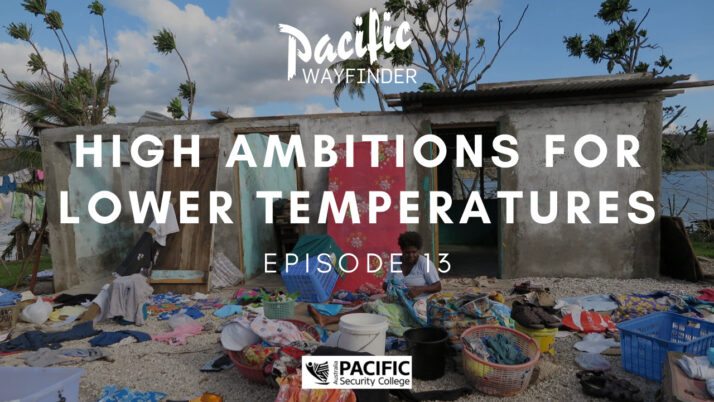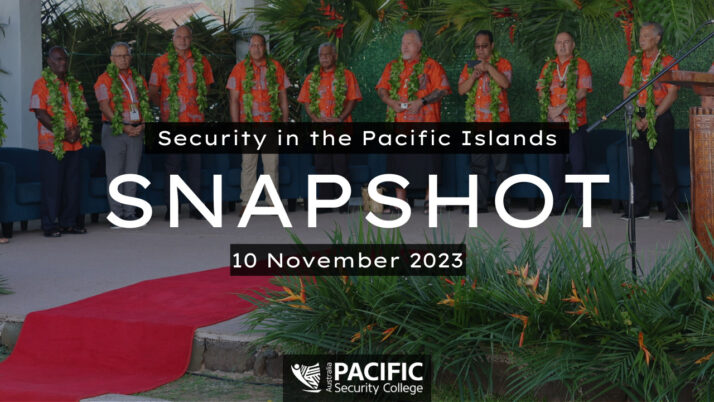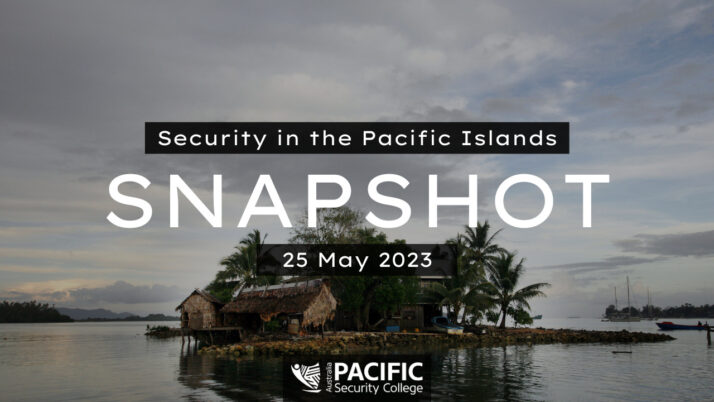Pacific Wayfinder: High Ambitions for Lower Temperatures

Villagers dry clothes in the aftermath of cyclone Pam in Vanuatu in 2015. Pacific leaders want better access to climate finance and insurance. Photo Ben Bohane
As leaders get ready for the COP26 summit in the coming weeks, Pacific Islands Forum Secretary General Henry Puna and Britain’s High Commissioner to Australia Vicki Treadell spoke to Ben Bohane about ensuring Pacific voices are heard.
Rising temperatures on land and sea caused by human-induced climate change are an existential threat.
In this ‘age of consequences’, decisions made at the upcoming 2021 United Nations Climate Change Conference (COP26) in Glasgow will have a material impact on the planet and humanity in the decades ahead. We are running out of time – and metaphors – to describe the urgency of the task ahead; to halt emissions and completely rewire our economies and societies to achieve a more sustainable future.
On the latest Pacific Wayfinder podcast, Pacific Islands Forum (PIF) Secretary General Henry Puna and Britain’s High Commissioner to Australia Vicki Treadell discussed what’s at stake at the upcoming summit.
Secretary General Puna discussed the effect of the recently published Intergovernmental Panel on Climate Change (IPCC) report on Pacific leaders in the lead-up to COP26.
“We were absolutely terrified when we read the IPCC report because… instead of the figures coming down, it’s gone up. And there is a very stark warning to all of us and particularly to the major emitters and developed countries of the world. Either we reverse direction and reduce our carbon emissions and achieve [no more than] 1.5 degrees at COP26, or we face horrendous consequences with climate change.”
Britain’s High Commissioner to Australia Vicki Treadell said the United Kingdom wants “concrete results” from the summit.
“This is a critical moment for the world, and we want as many world leaders to come to Glasgow to make that collective commitment with seriously higher ambition across four key pillars that we have set ourselves on mitigation, adaptation, finance and collaboration,” she said.
Pacific Island people have long been collaborative, adaptable, and eager to encourage global leaders to mitigate the worst impacts of climate change. However, they have also frequently faced bureaucratic roadblocks to the most important facilitator of climate mitigation – money.
Pacific leaders have often complained about the challenges in accessing climate finance, due in part to excessive bureaucracy and limited capacity in the islands to navigate complicated and lengthy processes. Even more frustratingly, donor countries have fallen well short of their climate financing commitments. Wealthy nations pledged US$100 billion last year towards a global climate fund aimed at assisting those most vulnerable, but according to the head of the Organisation for Economic Co-operation and Development (OECD) they missed this goal by at least $20 billion. Pacific leaders are entitled to ask, “where’s the money?”.
Puna and his team, including ‘climate champions’ from the region, will be attending COP26 despite the difficulties of travel during the COVID-19 pandemic, to make personal representations on behalf of the Pacific. Secretary General Puna is likely to seek a number of finance-related initiatives for the region, from compensation for ‘loss and damage’ to creating low-cost insurance options for small and medium size businesses in the region at a time when insurance is becoming so expensive that only large businesses can afford it. He believes “the whole architecture of finance needs to be reviewed.”
“Access to finance is very, very difficult. The way it’s structured, it’s very difficult for small island countries with small capital, you know, in their administration to access those funds,” he said.
“Just last year, the report from the OECD was that [only] about two per cent of global climate finance flowed to the small island developing states. This is totally wrong. It’s totally at odds with the spirit of the Paris Agreement, and it does nothing for the damage that small island developing states face and to help them overcome and build resilience to climate change.”
A range of finance-related ideas are being floated, from ‘blue bonds’ to the Pacific Resiliency Facility to ‘debt for nature swaps’, streamlining carbon offset programs to encourage commercial investment, and even perhaps a Pacific ‘green tech’ regional fund to encourage investment in renewables and other new technology. Pacific peoples are not short of innovative ideas, just global commitment.
Beyond finance, there’s a need to actively protect the natural world at a time of growing biodiversity loss and species extinction. High Commissioner Treadell calls for a “re-wilding of our world, restoring our rainforests and tackling things like illegal logging”. She has a particular interest in oceans policy and hopes these “blue lungs” can stay healthy.
Secretary General Puna agreed that healthy oceans are essential to nature-based solutions and future sustainability, reminding us that “96 per cent of Pacific territory is ocean”. Only recently elected as Secretary General, he said climate change is “front and center” in his mind.
However, there are other priorities he must also address as well, from COVID-19 and economic hardship, to nuclear contamination concerns due to discharges from Fukushima and the legacy of atomic testing in the Marshall Islands. Protecting sovereignty and maritime boundaries in perpetuity is also a high priority.
There is only so much Pacific leaders can achieve by Zoom calls at a time of closed borders, especially when so much of Pacific culture and diplomacy rests on cultivating personal relationships. Secretary General Puna said he looks forward to addressing the global summit in person to ensure Pacific voices are heard there while Britain, as host, will be working behind the scenes to bring consensus and action to one of the great challenges of our time.
Ben Bohane
This article is from our Pacific Wayfinder series, bringing you voices from the Pacific Island region. It is produced in conjunction with the Pacific Wayfinder podcast, produced by the Pacific Security College.
This article was originally published on Policy Forum.
More Stories

Security Snapshot - 10 Nov 2023
Pacific Security Snapshot | 10 November 2023
The security stories shaping the region 52nd Pacific Islands Forum Leaders’ Meeting in Cook Islands The South Pacific Connect Initiative Australia-United States commitments to Pacific finance and infrastructure Lowy Institute 2023 Pacific Aid Map Tropical Cyclone Lola hits Vanuatu and Solomon Islands Parties to the Nauru Agreement endorse the Kirimati Communique Tonga prepares for El…

Security Snapshot - 26 May 2023
Pacific Security Snapshot | 25 May 2023
The security stories shaping the region ➣ Papua New Guinea and the United States sign Defence Cooperation Agreement ➣ United States-Pacific Islands Forum Dialogue held in Port Moresby ➣ Pacific leaders meet Indian Prime Minister Narendra Modi ➣ Pacific call for climate finance breakthrough at UN session ➣ Tuvalu strengthens efforts against illegal, unreported and…






